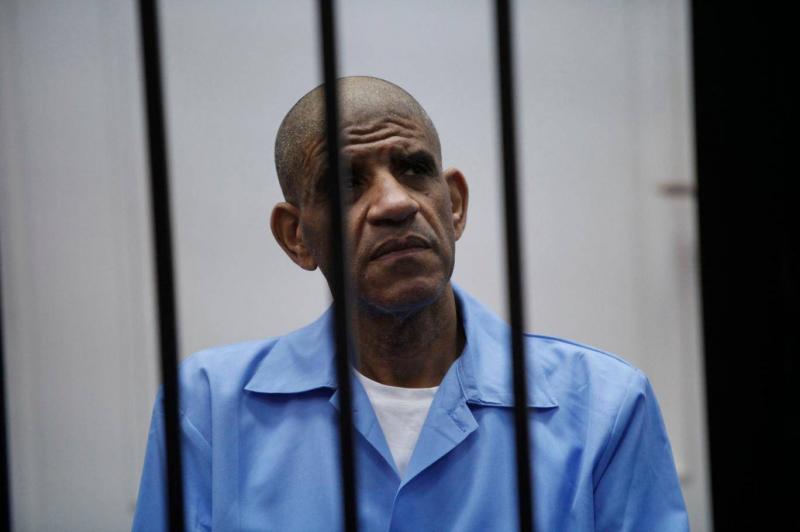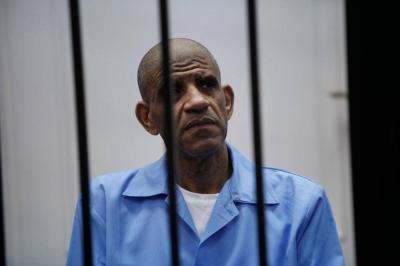The Court of Appeals in the Libyan capital, Tripoli, is set to issue its judgment today, Monday, regarding Abdullah Senussi, the head of the intelligence services in the former regime, on charges of committing crimes against humanity during the Libyan revolution. This comes after multiple adjournments of the session. Senussi's trial has been postponed over 10 times, amid accusations from his defense team of deliberate non-production by the responsible authorities to prolong his trial. However, the public prosecutor has confirmed that the trial is proceeding normally.
Senussi, who was the second man in Gaddafi's regime, has been held in a Tripoli prison since 2012 alongside dozens of other regime figures after being convicted of his role in the deaths of protesters during the 2011 revolution that toppled Gaddafi's regime.
#### Who is Abdullah Senussi?
Abdullah Senussi, the former head of Libyan intelligence, was one of the closest associates of the late Libyan President Muammar Gaddafi. Senussi comes from humble origins. His marriage to Gaddafi's wife's sister in the 1970s brought him closer to the ruling circles. He held several positions, including deputy head of the External Security Organization. According to leaked documents from the U.S. Embassy in Tripoli, Senussi was a close advisor to Saif al-Islam Gaddafi, Gaddafi's son.
Senussi was wanted by French authorities and the International Criminal Court (ICC). He left Libya after Gaddafi's fall but was arrested in 2012 after arriving from Morocco to Mauritania with a false passport. The ICC had issued an arrest warrant for Senussi, Gaddafi, and Saif al-Islam in 2011 for committing crimes against humanity against protesters in Benghazi at the beginning of the Libyan revolution in February 2011.
Observers consider Senussi merely an executor rather than a mastermind behind Gaddafi's regime practices. He was dubbed "the butcher" due to widely circulated accounts of his brutality. Senussi was extradited from Mauritania to Libya in 2012. Successive Libyan governments have insisted on trying Senussi within the country. The ICC concluded in 2013 that Libya was capable and ready to try Senussi without needing to transfer him to the court's premises.
Senussi was tried alongside 36 others from Gaddafi's regime and was sentenced to death by firing squad in July 2015, together with Saif al-Islam and seven other regime figures. Despite the Libyan government's assurance of its ability to conduct a fair trial, many believe the trial was influenced by the country's political turmoil. The trial did not involve witness testimony or the presentation and discussion of evidence in court.
Senussi is considered one of the prime accused in the "Abu Salim prison massacre" case that took place in 1996, where over 1,200 prisoners were killed at the prison in Tripoli. He is said to have ordered guards to stand on the ceilings and to shoot prisoners from above after riots erupted in the prison demanding better food and health conditions.
Senussi had previously been unable to travel freely due to a absentia ruling against him in France in 1999 for his involvement in the bombing of a French passenger plane in 1989. The plane exploded while flying over Niger, killing 170 people on board, most of whom were French.
#### The Lockerbie Incident of 1988
Experts also speculate that Senussi may have had information that could help the U.S. and the UK uncover some truths about the Lockerbie incident of 1988, when a "Pan Am" plane exploded over the town of Lockerbie in southern Scotland, killing 270 people on board. Scottish investigators suspect Senussi as one of two suspects in the ongoing investigation into the Lockerbie incident. Investigators have requested Libyan authorities to allow them to question Senussi in Tripoli.
It is believed that the two suspects assisted Abdelbaset al-Megrahi, the only person convicted in the case, who died in 2012. Senussi is thought to have recruited al-Megrahi for the operation. Senussi and al-Megrahi came from one of Libya's largest tribes, the Magarha tribe.
#### Abductions and Assassinations Outside Libya
Senussi is believed to possess information about Libyans who were abducted and assassinated in Europe and outside Libya during Gaddafi's rule. He is also thought to be privy to details regarding financing armed organizations, particularly in Africa. Additionally, it is reported that Senussi oversaw the construction of a nuclear reactor in southern Libya's desert, though its location has never been revealed.
Senussi was among the Libyan officials listed by the U.S. Treasury Department as individuals whose assets would be frozen if they fell under U.S. law. He is said to have numerous intertwined financial interests, similar to many members of Libya's political elite.
Today’s trial is likely to garner significant local attention, especially from supporters of the former regime and tribes from Fezzan, to which Senussi belongs, who have organized protests and have been exerting pressure for his release on health and humanitarian grounds, as well as to support national reconciliation efforts and close the chapter on the past.
Senussi’s family reports that his health condition is poor, claiming that his state has deteriorated due to a return of cancerous activity in the liver, which had previously been surgically removed after chemotherapy sessions. They assert that he lacks adequate health care and treatment inside prison and has been denied visits.




